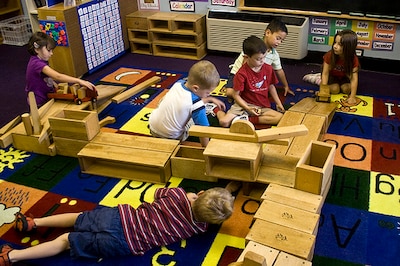
Kindergarten used to be a time when children dressed up in costumes, built cities out of blocks, and pretended to cook feasts in play kitchens. But now 5-year-olds are more likely to spend their school days practicing basic literacy and math skills.
In fact, kindergartners in New York City spend less than 30 minutes a day on creative play, several recent studies have found.
The shift toward academic kindergarten might boost children’s test scores in the short term but is not likely to make them successful in the long term, according to “Kindergarten in Crisis,” a report released this week by the Alliance for Childhood, a coalition of child development researchers. From the report:
The power of play as the engine of learning in early childhood and as a vital force for young children’s physical, social, and emotional development is beyond question. Children in play-based kindergartens have a double advantage over those who are denied play: they end up equally good or better at reading and other intellectual skills, and they are more likely to become well-adjusted healthy people.
The trend toward academic kindergarten isn’t news for anyone who’s been paying attention to the city’s public schools for very long. Back in 2006, my former colleague Clara Hemphill tackled the subject in a column in the New York Times. After visiting a kindergarten class at one of the city’s Achievement First charter schools, she wrote:
The classroom has no blocks, dress-up corners or play kitchens. There is no time for show and tell, naps or recess. There is homework every night. For much of the day, the children are asked to sit quietly with their hands folded as their teachers drill them in phonics, punctuation and arithmetic.
I visited a different Achievement First elementary school in 2008 and saw firsthand that the network had adapted its kindergarten program in response to criticism such as Hemphill’s. But they were still nothing like the play-dominated classrooms advocated for by the Alliance for Childhood.
